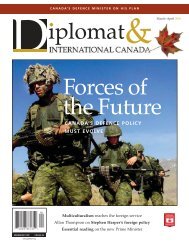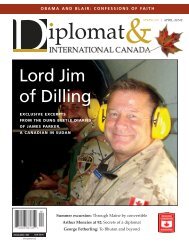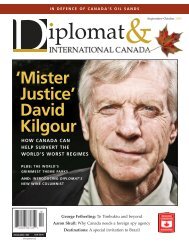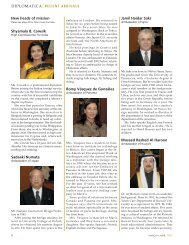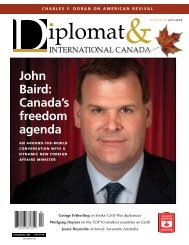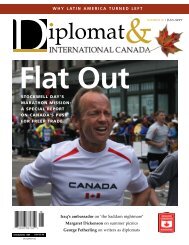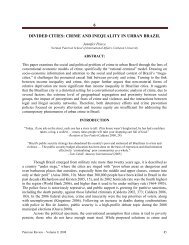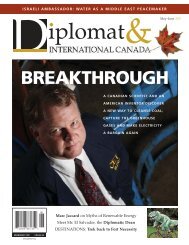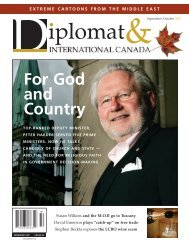the new petro power paradigm - Diplomat Magazine
the new petro power paradigm - Diplomat Magazine
the new petro power paradigm - Diplomat Magazine
You also want an ePaper? Increase the reach of your titles
YUMPU automatically turns print PDFs into web optimized ePapers that Google loves.
DEBATE|DIPLOMATICA<br />
verely affected rural subsistence farmers.<br />
Transnational organized crime does not<br />
recognize borders and <strong>the</strong> money <strong>the</strong> cartels<br />
use comes from consumer countries.<br />
Those markets, not <strong>the</strong> producer or transit<br />
countries, set <strong>the</strong> price for illicit drugs.<br />
When discussing narco-trafficking,<br />
people talk about a “balloon effect,”<br />
which is a basic way of describing how<br />
<strong>the</strong> “drug wars” and cartels relocate from<br />
one geographic region to ano<strong>the</strong>r depending<br />
on <strong>the</strong> pressure of counter-narcotic<br />
initiatives. Hence, when you press a balloon<br />
in one place it bulges in a <strong>new</strong> place.<br />
This metaphor has been used to advance<br />
a holistic approach to counter narcotics —<br />
one that simultaneously addresses most<br />
components of a security strategy in many<br />
geographic regions.<br />
Far from regarding <strong>the</strong> “war on drugs”<br />
as a failure — as some do loudly <strong>the</strong>se<br />
days — <strong>the</strong> efforts that have been accomplished<br />
in counter-narcotics and in<br />
streng<strong>the</strong>ning <strong>the</strong> rule of law in Latin<br />
America point to a comparative success.<br />
Organized crime wouldn’t “balloon”<br />
elsewhere if <strong>the</strong>re were no achievement to<br />
using <strong>the</strong>se strategies. The U.S. tackled <strong>the</strong><br />
problem in <strong>the</strong> early 1980s in <strong>the</strong>ir sou<strong>the</strong>rn<br />
states, and expanded operations to<br />
nor<strong>the</strong>rn Latin America under programs<br />
like “Plan Colombia” in <strong>the</strong> late 1990s and<br />
later in Mexico with <strong>the</strong> “Merida Initiative”<br />
(which also includes programs for<br />
Central America) in 2006.<br />
Colombia has improved, showing progress<br />
in <strong>the</strong> past 10 years with streng<strong>the</strong>ned<br />
state institutions, a stronger rule of law<br />
and a healthier democracy, which may<br />
also be <strong>the</strong> case in Mexico. In <strong>the</strong>se examples,<br />
<strong>the</strong> counter-narcotics programs<br />
“ballooned” <strong>the</strong> trafficking elsewhere, and<br />
this is why a comprehensive approach in<br />
addressing security issues and transnational<br />
organized crime is necessary.<br />
A comprehensive approach is essential<br />
to address most (if not all) issues in <strong>the</strong><br />
crucial regions of this hemisphere. Indeed<br />
to address <strong>the</strong> “drugs and thugs” reality,<br />
we need more than a Plan Colombia or<br />
a Merida Initiative. A Trans-American<br />
initiative is essential, one which must,<br />
of course, include Canada. As <strong>the</strong> U.S.<br />
assistant secretary for <strong>the</strong> bureau of international<br />
narcotics and law enforcement<br />
affairs, William R. Brownfield, said: “Our<br />
starting point is that <strong>the</strong>se are regional<br />
threats, not country specific.”<br />
Guatemala and Central America welcomed<br />
Canada’s high-level delegation at<br />
<strong>the</strong> conference, as well as its heightened<br />
engagement and awareness of <strong>the</strong>se issues.<br />
Nearly 40 countries participated, as<br />
well as <strong>the</strong> United Nations, <strong>the</strong> Organization<br />
of American States, <strong>the</strong> World Bank,<br />
<strong>the</strong> Inter-American Development Bank<br />
and <strong>the</strong> Central American Bank of Economic<br />
Integration (among o<strong>the</strong>rs).<br />
Some senior policy advisers and civil<br />
servants propose that as Canada winds<br />
down its presence in Afghanistan, it<br />
should establish a larger commitment in<br />
Central and Latin America. Increased aid<br />
to Latin America in fighting this scourge<br />
could become a <strong>new</strong> priority. Already,<br />
Canada’s noticeable contribution to a UN<br />
commission in Guatemala (<strong>the</strong> CICIG)<br />
is making visible progress. By joining<br />
Ameri-Pol, Canada could also benefit<br />
from enhanced hemispheric participation<br />
on <strong>the</strong> issue, while brandishing increased<br />
involvement in <strong>the</strong> region.<br />
In <strong>the</strong> fight against transnational organized<br />
crime in this hemisphere, Canada<br />
should raise its involvement in <strong>the</strong> security<br />
aspect as part of its trident “Americas<br />
Strategy.” Without success in security,<br />
Canada’s o<strong>the</strong>r two objectives — prosperity<br />
and democratic governance — could<br />
prove a futile pursuit. D<br />
diplomat and international canada 15



